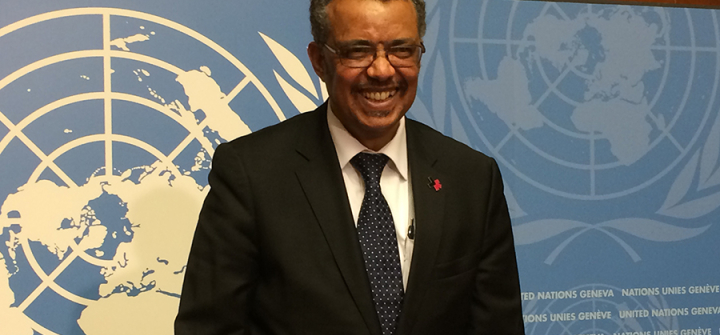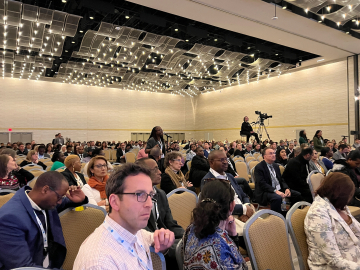Up First for Tedros: Budget, Then Universal Health Coverage
WHO’s budget situation requires immediate attention, while universal health coverage will be an enduring priority, Tedros Adhanom Ghebreyesus said Wednesday in his first press conference as WHO Director-General-elect.
“It is very important to move really fast in really addressing the budget issue,” Tedros said the morning after the election. He will to expand the number of countries contributing to the WHO and seek an increase in the assessed dues to provide a cushion against shocks to the WHO budget.
Dealing with WHO’s budget situation (nearly 80% of its funds are earmarked by countries for special programs) took on new urgency Tuesday when the Trump administration unveiled a proposed FY18 budget that had massive cuts to contributions to UN agencies, including the WHO. (One budget bright spot for Tedros: The World Health Assembly approved on Wednesday approved a 3% increase in Member State assessed contributions in its $4.4 billion budget for 2018 and 2019.)
Tedros said he has worked with Republicans and Democrats in the US and doesn’t consider the budget proposal to be the final. “If we can communicate with them in the right way, and know how to effectively communicate, I think we can also address that,” he said. “I don’t take it as a closed issue. I will continue to engage.”
He noted that large, sudden cuts to ongoing funding support are especially hard to deal with. “When there is a finance cut like this, the most affected are the poor,” he said. “Terminating it like that, I think, has its ramifications.”
The WHO needs to act quickly so the US and other countries regain confidence in the organization and provide more support. He also pledged to expand WHO’s fundraising unit and work with countries to increase assessments that support WHO general funds.
In his opening comments at the press conference, Tedros advocated for health as a human right and linked this to top priority for his campaign: universal health coverage.
“Health is a rights issue—an end in itself—and also health as a means to development. It is the smartest thing to invest [in]. All roads should lead to universal health coverage. It should be the center of gravity of our movement,” he said.
Noting the public, private and mixed health systems in different countries, Tedros said the WHO shouldn’t impose specific methods for achieving universal health coverage. “There is not one way or one means to achieve universal health coverage. We have to respect the diversity we see,” he said.
Other highlights from the press conference:
Vision Questions
Tedros emphasized the importance of a shared mindset and common goals amongst WHO staff and shared key questions to consider: “Do we belong to same vision? And do we have the similar priorities? Do we have concrete goals based on these priorities? Are we measuring it on regular basis? Do we have the right mind to accept measurement? Are we prepared to accept when there are weaknesses?”
Listen Closely
“I think the first thing I will really focus on now is listening to staff, member states … all partners and see what proposals actually come from that dialog,” he said.
Stop What?
Asked what WHO activities should be stopped, Tedros responded, “Anything that contradicts universal health coverage I think will stop.”
Travel Costs
Following Monday’s Associated Press story that zapped WHO for spending more on travel costs than it does on AIDS, TB and malaria, Tedros pledged to make WHO “as lean as possible.” He also noted that it can be misleading to separate travel expenses out of context but “if it is an unnecessary expense, it has to be stopped.”
Latest Ebola Outbreak
Tedros praised the Democratic Republic of Congo’s response to the recent Ebola outbreak and its coordination with partners on the ground: “I think that was a very good start, and we see also challenges, and we need to build on this, and implement the Emergency Response Program as a sense of urgency. I think it is very important for the whole world, as you know.”
Who Is This Guy?
Tedros explained his preference for being called by his first name because surnames are not commonly used in Ethiopia. “Everybody knows me in Ethiopia by my given name, by Tedros. If you ask [for me] saying Adhanom or Ghebreyesus, they will take time to remember, you know, who is this guy? So, call me Tedros.”
Ed. Note: See all of GHN’s #WHA70 coverage here.
Want to share a tip or a story idea or connect with GHN editor-in-chief Brian Simpson in Geneva? Please be in touch.
Join the thousands of subscribers who rely on Global Health NOW summaries and exclusive articles for the latest public health news. Sign up for our free weekday enewsletter, and please share the link with friends and colleagues: Subscribe to GHN
Stand and deliver: Tedros Adhanom Ghebreyesus at his first press conference as WHO DG-elect. Image: Brian W. Simpson





